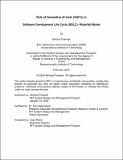Role of Generative AI tools (GAITs) in Software Development Life Cycle (SDLC)- Waterfall Model
Author(s)
Prakash, Mridula
DownloadThesis PDF (7.693Mb)
Advisor
Rebentisch, Eric
Terms of use
Metadata
Show full item recordAbstract
The emergence of generative artificial intelligence tools (GAITs) has garnered considerable attention in recent years. These tools, powered by advanced machine learning algorithms, have the ability to generate new and innovative solutions to complex problems. As a result, organizations across various domains are increasingly seeking to reduce human involvement and rely extensively on AI tools to enhance productivity and effectiveness. The continuous advancement of AI technology has paved the way for its integration into software development, bringing forth an era of unparalleled innovation and efficiency. The amalgamation of AI and software development goes beyond mere task automation; it empowers developers and engineers to reimagine the entire process of conceptualizing, designing, and maintaining software.
As the roles of teams evolve, the AI tools into the Software Development Life Cycle (SDLC) need to tap into the positive benefits of AI. This thesis is motivated by the widespread availability of AI tools, whose adoption and consequent benefits are still not well understood. This thesis targets the evolution of GAITs in crafting each phase of the SDLC. It details the merits, accuracy and utility requirements for engineers. The research questions delineated will anchor the investigation into the targeted areas of only SDLC in waterfall model. The examination of this thesis is centered around assessing GAITs efficiency in formulating meaningful results in each phase of SDLC, scrutinizing the results and probing the impact of generation on software quality and dependability. The research demonstrates the functionality of GAITs analyzing their impact in each phase of SDLC by iterating over systems of various complexities. Further it illustrates the concept of understanding the GAIT tool, drawing insights and usage of GAIT beyond mere automation in software development life cycle.
Date issued
2024-02Department
System Design and Management Program.Publisher
Massachusetts Institute of Technology